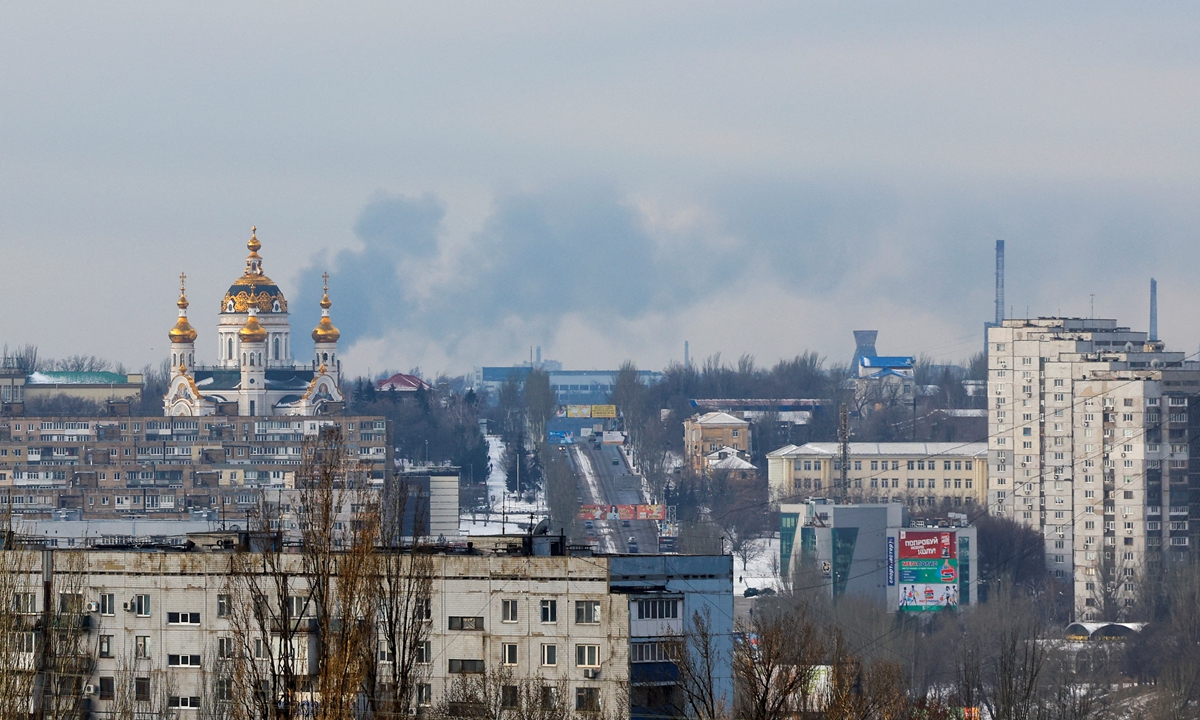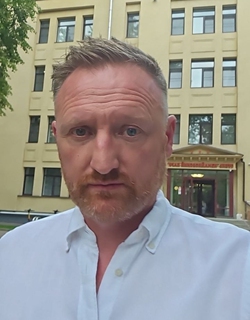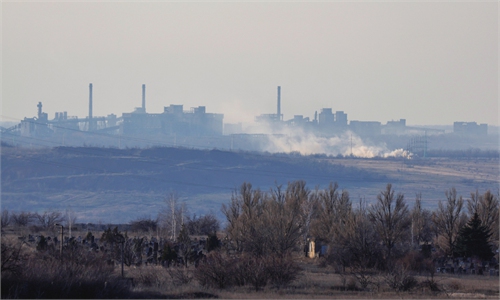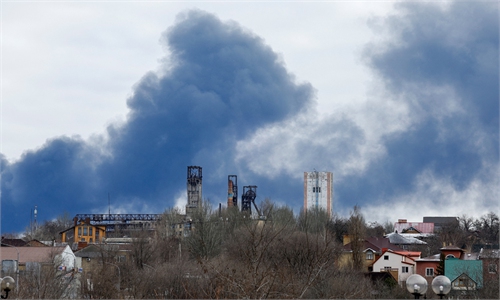Two years after Russia-Ukraine conflict, Western hypocrisy is harder and harder to sell

Smoke from fire rises above a city in the Donetsk region on January 22, 2024. Photo: IC
Editor's Note:February 24 marks the anniversary of the Russia-Ukraine conflict, which has been ongoing for two years with no end in sight. Why can't the conflict be resolved? As it continues, has the West's mentality of "defeating Russia" evolved? How does the conflict impact global geopolitical patterns? The Global Times (GT) collected views within the US and Europe.
In the fourth interview of the series, Chay Bowes (Bowes), an Irish journalist, writer and analyst, who addressed the conflict at a UN Security Council meeting on June 2023, shared his insights.
GT: The Russia-Ukraine conflict is entering its third year. What do you think is the biggest obstacle to ending the conflict?
Bowes: I have been living here in Russia and working among Russians. The view from this side is certainly that the biggest obstacle to ending the conflict is the West. There is an appetite for peace in Ukraine among ordinary Ukrainian and Russian people, and in the Russian government.
The view in Russia is that the main obstacle is Ukraine's Western backers, who are providing weapons, cash and political support for the prolongation, and in some ways, the expansion of this conflict.
From my own personal view, regardless of how you believe this conflict started - in the Maidan protest in the beginning in 2014, there was CIA or American support - the main reason this war is able to continue is due to Western aid, money and weapons. President Vladimir Putin made it quite clear in his interview with Tucker Carlson, if they want the war to stop, they can easily end it.
GT: How do you suggest the Russia-Ukraine conflict could be resolved?
Bowes: The conflict must be resolved and will be resolved - all conflicts end in some kind of accommodation. This is a fact of history.
But at this stage, the frustrations the Russians feel here, as President Putin said in his interview with Carlson, Russia did advocate for a peace deal very early on in the conflict, which was, according to Russia, and according to facts and data, stopped by the British prime minister in conjunction with the White House that the Ukrainians should fight on, that they shouldn't come to an accommodation with the Russians.
That frustration has made the Russians consider that they can't really trust any Western-brokered peace deal, and that this peace will have to be agreed on the basis of the realpolitik, the real situation on the ground.
The real situation on the ground is that the Russian economy is strong. We hear that the West-backed attempt at this economic war against Russia has failed. It's damaging the Western world far more than it has done to Russia.
Ordinary Russian people on the streets are now resigned to the fact that this war may continue until Russia achieves its goals. It seems that the old pathways of diplomacy that existed during the Cold War between Russia and America, between the security services and diplomats, these bridges have collapsed into the water. The longer the war goes on, it seems to me, the more territory Russia gains, the stronger the Russian economy becomes. President Putin is very popular here among Russians, despite what the Western media might tell you. More fatigue will creep in among the Western backers of Ukraine. Ukraine has no way to fight this war. It has no economy to fund the conflict. It has diminishing manpower. It's desperate to recruit more men into the military.
This is a proxy war with the West desperately trying to prop up what remains of Ukraine's resistance. And what has happened recently doesn't bode well.
GT: Have the Israel-Palestine conflict and the Red Sea crisis diverted Americans' attention from the Ukrainian battlefield?
Bowes: It absolutely has. It has shone a light on Western hypocrisy.
Take the allegations made against Russia about its conduct in Ukraine - targeting the civilians. When we see what's happened in Palestine with literally thousands and thousands of children, men, women, innocent civilians being killed in a very short space of time, this shone a light on Western hypocrisy - the reticence among Western powers to condemn Israel, their ally. The US is the foremost ally of Israel. Since Israel's founding in 1948, the US has given hundreds of millions of dollars, mostly in military aid to prop up its very militaristic behavior against Palestinians.
Prior to October, last year, people were becoming war weary when Ukraine wasn't achieving on the battlefield. The various weapons, the leopard tanks, the challenger tanks and everything that was meant to turn the conflict around, all these game changers, the counter offenses, which were going to seize territory, had absolutely failed. Many Ukrainians are dying and people are becoming weary.

Chay Bowes. Photo: Courtesy of Bowes
GT: How will the US presidential election this year affect the trajectory of the conflict?Bowes: If there wasn't a presidential election this year, we may have already had peace.
Take the Vietnam War. It was artificially prolonged by the Americans in order to go through their electoral cycles. No American president, presidential nominee or presidential candidate wants to withdraw from a war or lose a war during the election cycle.
Donald Trump declared that he would solve the crisis within 24 hours if reelected. Everybody in the US accepts that without American money, American fuel, American political input and intelligence, this conflict could not have lasted this long.
Joe Biden is now suggesting that anybody who is against prolonging the war, by continually funding more and more billions of dollars into Ukraine, which doesn't really be having an impact and seems to be losing militarily, economically and politically, is sort of complicit in the empire of Russia.
This war in Ukraine is being prolonged by the Biden administration, in order to not deliver a catastrophic failure. It is certainly not going to end until the outcome of the US elections is known.
GT: How does the Russia-Ukraine conflict affect the image of the US?
Bowes: It has done so in a very negative way. I think much of what the US has been doing since the end of World War II, is now essentially obvious to everybody watching this show.
Since the end of World War II, the US has been responsible for the deaths of tens of millions of human beings. It's not Russia, it's not China or Iran, or any country the West says is the enemy. They haven't invaded other countries or overturned other governments. The CIA was aggressive and moved to destabilize Ukraine in the post war period in the 1950s. There had been several operations to try and peel away the Ukrainian soviet socialism from the Soviet Union.
The US has been at war for over 90 percent of its existence. It sells more weapons and spends more money on war than the next 10 countries combined.
China is portraying the idea that the age of divide and conquer is over and this is the age of unite and prosper. It's also doing that with countries like Russia, and saying this isn't an exclusive globe, we just want to build a better world on the basis of cooperation, rather than domination.
The US, on the other hand, has a lot of social problems in its own country. Nearly 40 million Americans live in poverty. It can send hundreds of billions of dollars to other countries to carry out wars against these perceived enemies while its education system and medical system are collapsing. How did this happen if the US is the leader of freedom? And who are the winners and losers here in this perpetual war?
The title of the Munich Security Report this year is "Lose-Lose?" It suggested that more and more countries are peeling away from this global hegemony and US-dominated world. They're looking to a world where they can trade in their own currency, where they can protect, define and celebrate their own culture, language, heritage and religion within the protection of a much more pluralistic, multilateral and multipolar world. This is why BRICS is so powerfully burgeoning and growing and offering so much hope to countries in Africa and in Southeast Asia for a more pluralistic, fairer way to do business.
So, of course, it has impacted the US image. The US has leveraged everything it has to try and inflict its strategic defeat on Russia, but it has failed. The Russian military has shown itself to be strong and capable, and the Russian military industrial complex is growing. While NATO and the US seem to be bickering among themselves, many people in Europe now don't see the EU as a light of freedom. They see it as a light of oppression. There's a lot of media oppression now in Europe, as well as a lot of laws in countries like Ireland where I'm from, that make it impossible to argue against a certain way of thinking.
But in this age of global media where we can talk, I can talk to you from Moscow, and the voices of reason and the voices of dissent are very difficult to suppress.
One can't keep selling the same magic potion or medicine, and then keep failing. People will eventually ask: What did we get from this? How does it work? It will be much harder to sell the idea that in order to be free, you have to be like us, think like us, use our currency, abide by our religion of freedom, regardless of 40 million people living in poverty, people living in the streets, a huge drug crisis, a failing society. That pseudo-religious belief in this global American freedom, this neoliberal hegemony, is essentially running out of air.
Yet for Western institutes, whatever Russia does, is much like whatever China does, whatever it does will be wrong. The US can dominate its neighbors economically and military. This hypocrisy is becoming more and more evident and obvious. And that hypocrisy in regards to the Ukrainian conflict is now obvious when you look at Palestine.
Throughout the Ukrainian conflict, Russia has not targeted civilians. People have died, regrettably. That's a tragedy. But there is certainly no policy of attacking civilians by the Russian military.
Western hypocrisy is harder and harder to sell in an age of global Information. I think that's critical. 2024 will be a really pivotal year for BRICS, for the Global South and for hope. There's huge hope that we can build a fairer, more equitable world based on partnership, friendship and trade.
But I also think that the American empire, and the power it exerts on the European outpost, is waning. The cracks are appearing. Over the next year, it's going to be a remarkable period to watch it.


